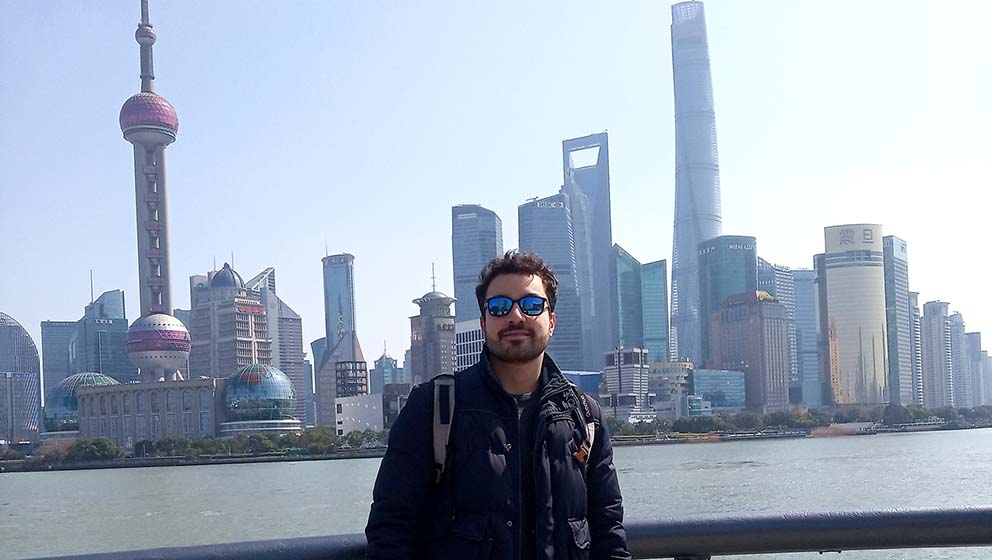Student mobility in the time of COVID-19. Andrea Riccio, Exchange student at Groupe ESSCA Shanghai (Shanghai, China)

What made you decide to stay abroad to continue your exchange program rather than come back to Italy?
Having decided to focus heavily on this program and not to do a curricular internship, I really didn’t want to give up after just one month. The problem started right here in China and I never thought it would have become a global issue. Thinking about it I realized it was a pretty big problem but believed that in time, and with the measures that the country was putting in place, things might have improved. My thoughts were that “I’m here for the long run, and unless I find myself in extremely dangerous situations or the Italian Consulate forces me to return, I will live this experience as it is and I’m sure that I will gain something
from having lived through it in any case.”
How did your host university reorganize to deal with the emergency? Are you staisfied with the support you have had and the academic offer so far?
I have to say that the university was very well organized and a short time after the schools closed at the end of the Chinese holiday period they set up a Microsoft Teams portal so that we could do lessons on-line. It was certainly an unusual situation but after a bit you get used to it. The professors were up to it and the program allowed for a lot of interaction. The only thing that I found difficult to get used to was the lesson timetable: the times were late in the evening so that they could include the students who had returned to Europe. The university also kept us updated on the situation and made sure we knew what measures to take at the beginning.
Has Cattolica been supportive at this time?
I believe the University gave us a lot of support. As soon as the problem became serious I was immediately contacted by the International Office in Milan and Piacenza who asked me how I was and what I wanted to do.
What is your opinion of distance learning?
Well, it’s different. Face-to-face methods are certainly better. Those teaching on-line need to have good communication skills and know how the platform works. There is one good point – you don’t have to spend time traveling to class on public transport.
Are you learning anything from thhis experience? Has it changed you in any way? How are you feeling right now?
I feel different, for sure, as I have done every time I have found myself out of my comfort zone. I like to get involved and learn. Certainly, living in China is rewarding and it opens your mind in many ways. Living alone on the other side of the world certainly leads to personal growth. Putting yourself on the line in a foreign university, taking exams in English, getting used to living in a country with a totally different culture with difficulties like and the local language are definitely all challenges to overcome.
What are you doing every day?
I wake up in the morning, I work on group work and projects for the subjects I am studying, I cook or order something in, and then at 3 p.m. I start my first online lesson. My second lesson goes from 6.30 to 9.30 in the evening. Late evening I sometimes spend finishing my assignments, or otherwise I might relax or spend time with my international friends. If I don’t have lessons during the day, I go to a cafe to work or wander around the city.
Can you recount any episodes that touched you about the way the Chinese dealt with the worst days of the Coronavirus emergency?
What made an impression on me was how a city like Shanghai could be so deserted. I went out occasionally to do some shopping and took the opportunity to take a long walk, which was allowed at the time. What struck me were the measures that they took and how quickly they took them. Some of these precautionary measures are still being used to monitor the situation. Temperatures are checked at the entrance to restaurants, companies and shops, where note is taken of names and phone numbers, and hand gel is available. There are machines that measure your temperature automatically as you go into the subway. Delivery services don’t leave items by your door any more. Things are delivered to the main door of the building and often, apart from the receipt, there is a sheet of paper with a note of the temperature reading of the cook and the delivery person and a note certifying that the item has been sterilized.
You have an Health QR code on your phone which you often have to show when you go into restaurants and bars etc, which depending on your geolocalization during the day tells you how near you have been to someone with the virus. Green shows you are safe. When people go back to their normal routine, nearly everyone wears a mask.
What would you say to other students to help them be strong at this time?
To not give up. Life is made up of great challenges and sometimes there will be unexpected difficulties. This situation has touched everyone and will continue to do so in the future. You just have to keep to the rules and do this not just for yourself but for your communities and the society you live in. We have to stay at home more than usual – it’s not easy but you have to try not to think about the bad things and keep busy. There are so many things you can do: read, cook, meditate, study, watch movies, keep fit, and so much more.
Article featured on Worldbound, edition n.4-2020.

